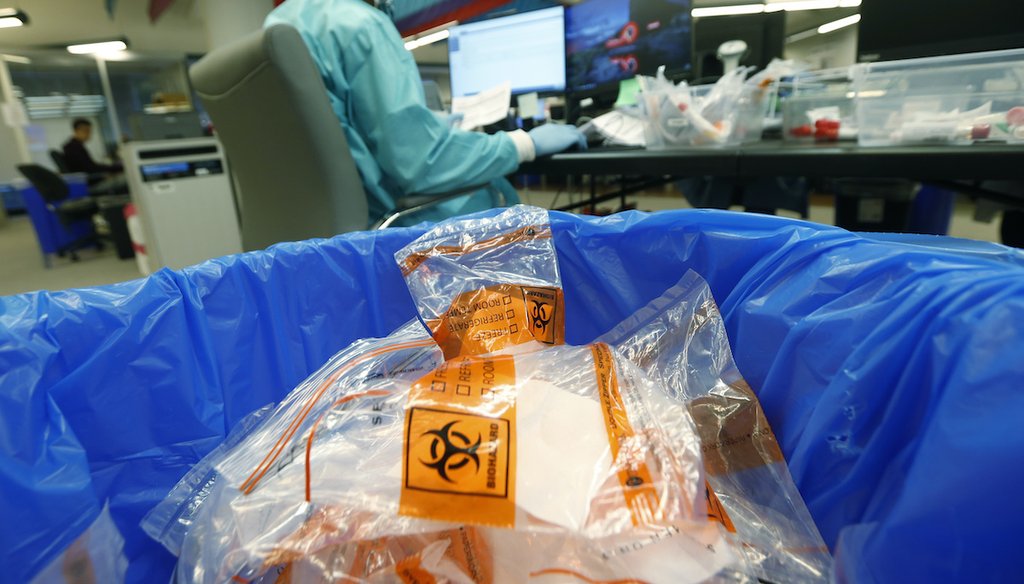

Our only agenda is to publish the truth so you can be an informed participant in democracy.
We need your help.


Discarded biohazard bags fill a trash can at Genetworx Clinical Lab in Richmond, Va. April 24, 2020 (AP Photo/Steve Helber)
The coronavirus spreads almost exclusively through respiratory droplets carried through the air. It does not live or spread on surfaces, so masks and gloves used by the general public to protect against COVID-19 infection aren’t considered medical waste that requires special handling.
Medical waste containers, or biohazard bins, are used by health care facilities for items contaminated with hazardous infectious materials such as blood or other internal body fluids.
Personal protective equipment used by the general public doesn’t need to be disposed of like medical waste. Masks to prevent the spread of COVID-19 can be thrown away in the trash because the coronavirus doesn’t spread or survive easily on surfaces.
A year-old Facebook post that questions why masks and gloves used to prevent the spread of the deadly COVID-19 virus aren’t treated as a biohazard is drawing new attention from social media users.
"Why are there no biohazard bins for mask and gloves if this virus is so contagious and deadly," the post asks.
The post was flagged as part of Facebook’s efforts to combat false news and misinformation on its News Feed. (Read more about our partnership with Facebook.)
The post implies that the lack of special disposal protocols suggests the virus isn’t as dangerous as it’s made out to be. But that’s based on a misunderstanding of how the virus spreads and what types of medical waste require special handling.
The Environmental Protection Agency says biohazard bins, or medical waste containers, are generally used by health facilities such as hospitals, doctors’ offices, blood banks and veterinary clinics — not the general public.
"Generally, medical waste is health care waste that may be contaminated by blood, body fluids or other potentially infectious materials and is often referred to as regulated medical waste," the organization states. Used needles are also listed as infectious materials. Such waste is treated and disposed of with alternative technologies according to state health and environmental agency guidelines.
Other types of protective equipment used by the general public do not require special handling, a spokesperson for the Centers for Disease Control and Prevention said.
Unless it’s contaminated with blood, feces or certain other potentially infectious materials, "it can be discarded into a trash bag along with other household waste," the spokesperson said.
But what if a person is at home, stanching their bloody nose with a tissue, for example? Dr. Paul Offit, an attending infectious-disease physician at the Children’s Hospital of Philadelphia, explained that when health workers dispose of waste contaminated by blood, it’s presumably because they’re treating someone with a virus such as AIDS, measles or Hepatitis A that is transmitted through blood, he said. But if a person at home treats their bloody nose, they usually aren’t infected with a virus, so that tissue can be thrown into the trash.
The types of masks used to control COVID-19 can also be safely discarded because the coronavirus doesn’t spread or survive easily on surfaces, said Offit. It’s spread mostly through respiratory droplets carried through the air or by contact with hands.
Even surgical-style or N95 masks used by the general public can be safely discarded by putting them into a plastic bag and throwing them into the trash, the U.S. Food and Drug Administration says.
In most situations, gloves are not recommended by the CDC to protect against COVID-19 except when cleaning or caring for someone who is sick. In those cases, use disposable gloves and wash your hands after throwing them away.
A Facebook post suggested that the coronavirus is not so dangerous, because there are no biohazard bins to discard COVID-19 masks and gloves.
The claim reflects a misunderstanding of how the virus spreads.
The coronavirus spreads almost exclusively through respiratory droplets carried through the air. It does not live or spread on surfaces, so masks and gloves used by the general public to protect against COVID-19 infection aren’t considered medical waste that requires special handling.
Health experts say it’s safe to throw away disposable masks used to guard against infection. Gloves are not needed unless a person is cleaning or caring for someone who is sick, and they can be thrown away afterward.
We rate this claim False.
Facebook post, July 11, 2020
Environmental Protection Agency, Medical Waste, accessed Jul 21, 2021
Environmental Protection Agency, Links to Hazardous Waste Programs and U.S. State Environmental Agencies, accessed July 21, 2021
Email interview with Kristen Nordlund, spokesperson for CDC, July 11, 2021
Phone interview with Dr. Paul Offit, director of the Vaccine Education Center and an attending physician in the Division of Infectious Diseases at Children's Hospital of Philadelphia, July 11, 2021
Centers for Disease and Safety Control, When to Wear Gloves, accessed July 11, 2021
U.S. Food and Drug Administration, N95 Respirators, Surgical Masks, and Face Masks, accessed July 11, 2021
In a world of wild talk and fake news, help us stand up for the facts.
